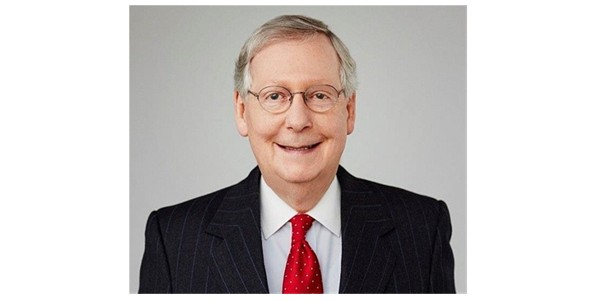"Tomorrow, the Senate must do what we were created to do. We have done our duty. We have considered all arguments. We have studied the "mountain of evidence." And tomorrow, we will vote. We must vote to reject the House's abuse of power. Vote to protect our institutions... I urge every one of my colleagues to cast the vote that the facts in evidence, the Constitution, and the common good clearly require. Vote to acquit the President of these charges.'

U.S. Senate Majority Leader Mitch McConnell
WASHINGTON, D.C. – U.S. Senate Majority Leader Mitch McConnell (R-KY) delivered the following remarks today on the Senate floor regarding the Senate Impeachment Trial:
'These past weeks, the Senate has grappled with as grave a subject as we ever consider: A request from a majority in the House of Representatives to remove the president.
'The Framers took impeachment extremely seriously. But they harbored no illusions that these trials would always begin for the right reasons. Alexander Hamilton warned that "the demon of faction" would "extend his sceptre" over the House of Representatives "at certain seasons." He warned that "an intemperate or designing majority in the House" might misuse impeachment as a weapon of ordinary politics rather than an emergency tool of last resort.
'The Framers knew impeachments might begin with overheated passions and short-term factionalism. But they knew those things could not get the final say. So they placed the ultimate judgment not in the fractious lower chamber, but in the sober and stable Senate.
'They wanted impeachment trials to be fair to both sides. They wanted them to be timely, avoiding the "procrastinated determination of the charges." They wanted us to take a deep breath and decide which outcome would reflect the facts, protect our institutions, and advance the common good.
'They called the Senate, quote, "the most fit depositary of this important trust." Tomorrow, we will know whether that trust was well placed.
'The drive to impeach President Trump did not begin with the allegations before us.
'Here was reporting in April of 2016: "Donald Trump isn't even the Republican nominee yet... [but] 'Impeachment' is already on the lips of pundits, newspaper editorials, constitutional scholars, and even a few members of Congress."
'Here was the Washington Post headline minutes after President Trump's inauguration: "The campaign to impeach President Trump has begun."
'The articles of impeachment before us were not even the first ones House Democrats introduced. This was go-around number seven. Those previously-alleged "High Crimes and Misdemeanors" included things like being impolite to the press and to professional athletes.
'It insults the intelligence of the American people to pretend this was a solemn process reluctantly begun because of withheld foreign aid. No, Washington Democrats' position on this President has been clear for years.
'Their position was obvious when they openly rooted for the Mueller investigation to tear our country apart and were disappointed when the facts proved otherwise. It was obvious when they sought to impeach this President over and over.
Here's their real position: Washington Democrats think President Donald Trump committed a "High Crime or Misdemeanor" the moment he defeated Secretary Clinton in the 2016 election.
'That is the original sin of this presidency: That he won and they lost.
'Ever since, the nation has suffered through a grinding campaign against our norms and institutions from the same people who keep shouting that our norms and institutions need defending.
'A campaign to degrade our democracy and delegitimize our elections from the same people who shout that confidence in our democracy must be paramount.
'We have watched a major American political party adopt the following absurd proposition: We think this president is a bull in a china shop, so we're going to drive a bulldozer through the china shop to get rid of him.
'This fever led to the most rushed, least fair, and least thorough presidential impeachment inquiry in American history.
'The House inquiry into President Nixon spanned many months. The special prosecutors' investigation added many more months. With President Clinton, the independent counsel worked for years.
'It takes time to find facts. It takes time to litigate executive privilege, which happened in both those investigations. Litigating privilege questions is a normal step that investigators of both parties understood was their responsibility.
'But this time — no lengthy investigation. No serious inquiry. The House abandoned its own subpoenas. They had an arbitrary political deadline to meet. They had to impeach by Christmas.
'So in December, House Democrats realized the Framers' nightmare. A purely partisan majority approved two articles of impeachment over bipartisan opposition. And after the Speaker of the House delayed for a month in a futile effort to dictate Senate process to Senators, the articles finally arrived here in the Senate.
'Over the course of this trial, Senators have heard sworn video testimony from 13 witnesses over 193 video clips. We have entered more than 28,000 pages of documents into evidence, including 17 depositions. Members asked 180 questions.
'In contrast to the House proceedings, our trial gave both sides a fair platform. Our process tracked with the structure that Senators adopted for the Clinton trial 20 years ago.
'Just as Democrats such as the current Democratic Leader and then-Senator Joseph Biden argued at length in 1999, we recognized that Senate traditions impose no obligation to hear new live witness testimony if it is not necessary to decide the case. The House Managers themselves said over and over that additional testimony was not necessary to prove their case. They claimed dozens of times that their existing case was "overwhelming" and "incontrovertible." That was the House Mangers saying their evidence was overwhelming and incontrovertible at the same time they were arguing for more witnesses.
'But in reality, both of the House's accusations are constitutionally incoherent.
'The "obstruction of Congress" charge is absurd and dangerous. House Democrats argued that any time the Speaker invokes the House's "sole power of impeachment," the President must do whatever the House demands, no questions asked. Invoking executive-branch privileges and immunities in response to House subpoenas becomes an impeachable offense itself.
'Here's how Chairman Schiff put it back in October. Quote: "Any action... that forces us to litigate, or have to consider litigation, will be considered further evidence of obstruction of justice."
'That is nonsense. "Impeachment" is not some magical constitutional trump card that melts away the separations between the branches of government. The Framers did not leave the House a secret constitutional steamroller that everyone somehow overlooked for 230 years.
'When Congress subpoenas executive-branch officials with questions of privilege, the two sides either reach an accommodation or take to the courts.
'That is the way this works.
'Can you imagine if the shoe were on the other foot? How would Democrats and the press have responded if House Republicans had told President Obama, We don't want to litigate our subpoenas over Fast and Furious, so if you make us set foot in court, we'll just impeach you?
'Of course, that's not what happened. The Republican House litigated its subpoenas for years until they prevailed.
'So much for "obstruction of Congress."
'And the "abuse of power" charge is just as unpersuasive and dangerous.
'By passing that article, House Democrats gave into a temptation that every previous House has resisted. They impeached a president without even alleging a crime known to our laws.
'I do not subscribe to the legal theory that impeachment requires a violation of a criminal statute. But there are powerful reasons why, for 230 years, every presidential impeachment did allege a criminal violation.
'The Framers explicitly rejected impeachment for "maladministration" — a general charge under English law that basically encompassed bad management; a sort of general vote of no confidence. Except in the most extreme circumstances, except for acts that overwhelmingly shocked the national conscience, the Framers decided presidents must serve at the pleasure of the electorate and not the pleasure of House majorities.
'As Hamilton wrote, "it is one thing to be subordinate to the laws, and another to be dependent on the legislative body."
'So House Democrats sailed into new and dangerous waters. The first impeachment unbound by the criminal law. Any House that felt it needed to take this radical step owed the country the most fair and painstaking process; the most rigorous investigation; the most bipartisan effort. Instead, we got the opposite. The exact opposite.
'The House Managers argued that the President could not have been acting in the national interest because he acted inconsistently with their own conception of the national interest, a conception shared by some of the President's subordinates.
'This does not even approach a case for the first presidential removal in American history.
'Such an act cannot rest alone on the exercise of a constitutional power, combined with concerns about whether the President's motivations were public or personal, and a disagreement over whether the exercise of the power was in the national interests.
'The Framers gave our nation an ultimate tool for evaluating a President's character and policy decisions. They're called elections.
'If Washington Democrats have a case to make against the President's re-election, they should go out and make it. Let them try to do what they failed to do three years ago and sell the American people on their vision for the country.
'I can certainly see why, given President Trump's remarkable achievements over the past three years, Democrats might feel uneasy about defeating him at the ballot box. But they don't get to rip the choice away from the voters just because they're afraid they might lose again.
They don't get to strike President Trump's name from the ballot just because, as one House Democrat put it, "I'm concerned that if we don't impeach [him], he will get re-elected."
'The impeachment power exists for a reason. It is no nullity. But invoking it on a partisan whim to settle three-year-old political scores does not honor the Framers' design. It insults the Framers' design.
'Frankly, it is hard to believe that House Democrats ever really thought this reckless and precedent-breaking process would yield 67 votes to cross the Rubicon.
'Was their vision so clouded by partisanship that they really believed this would be anywhere near enough for the first presidential removal in American history?
'Or was success beside the point? Was this all an effort to hijack our institutions for a months-long political rally?
'Either way — "the demon of faction" has been on full display. But now it is time for him to exit the stage.
'We have indeed witnessed an abuse of power: A grave abuse of power by just the kind of House majority the Framers warned us about.
'So tomorrow, the Senate must do what we were created to do. We have done our duty. We have considered all arguments. We have studied the "mountain of evidence." And tomorrow, we will vote.
'We must vote to reject the House's abuse of power. Vote to protect our institutions.
'Vote to reject new precedents that would reduce the Framers' design to rubble.
'Vote to keep factional fever from boiling over and scorching our Republic.
'I urge every one of our colleagues to cast the vote that the facts in evidence, the Constitution, and the common good clearly require.
'Vote to acquit the President of these charges.'
###











